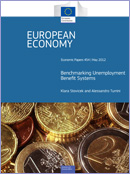|
|
|
|
|
|
|
|
 |
 |
 |
 |
Commission sets out the next steps for stability, growth and jobs
On 30 May, the European Commission adopted a package of recommendations for budgetary measures and economic reforms to enhance financial stability, boost growth and create employment across the EU. The package concludes the second European Semester of economic policy coordination and gives guidance for national policies in 2012-2013. It includes country-specific recommendations for each of the 27 Member States and recommendations for the euro area as a whole. While the Commission finds that Member States are on the whole taking the necessary action to restore sustainability, in several cases consolidation should be more growth-friendly. In addition, immediate action needs to tackle unemployment, particularly youth unemployment, by increasing productivity and better match skills and training to labour market needs. More action is also required across the EU to unlock its growth potential, create opportunities for business development, and unleash the job-creating potential of the services and energy sectors and the digital economy.
|
 |
 |
 |
|
 |
 |
 |
 |
 |
|
 |
 |
 |
Today the Commission has taken important decisions that set out the further action that needs to be taken both at national level by each of our Member States and at the EU level to enhance our competitiveness, boost growth and jobs, and to strengthen decisively our economic and monetary union…We have made good progress: public finances are starting to improve and imbalances are beginning to be unwound. The direction is clear. We now need to redouble our efforts, at both the national and European levels, to move faster and further.
José Manuel Barroso, President of the European Commission
|
 |
|
|
|
 |
 |
 |
 |
Following in-depth reviews, Member States are to tackle macroeconomic imbalances
The European Commission has published the results of in-depth reviews of twelve Member States. The reviews, published on 30 May, are part of the Macroeconomic Imbalance Procedure, which was introduced to prevent and correct macroeconomic imbalances and is being implemented for the first time this year. The twelve Member States are Belgium, Bulgaria, Cyprus, Denmark, Finland, France, Italy, Hungary, Slovenia, Spain, Sweden and the United Kingdom.
The Commission’s conclusion was that all twelve are suffering from imbalances that need to be corrected and closely monitored, though none are currently excessive. It also concluded that the adjustment of economic imbalances is broadly proceeding, although in some cases it is not clear to what extent the adjustment is complete and durable, or whether the speed of adjustment is adequate.
|
 |
|
 |

|
|
 |
 |
 |
 |
Commission recommends abrogation of Excessive Deficit Procedure for Bulgaria and Germany, lifting of Cohesion Fund suspension for Hungary
In recommendations issued on 30 May, the European Commission concluded that the correction of the excessive deficits of Germany and Bulgaria is ensured, and that Hungary has taken the necessary corrective action to justify the lifting of the suspension of its Cohesion Fund commitments. In March of this year, Bulgaria and Germany reported that their respective 2011 general government deficits were below 3% of GDP. Following the validation of these figures by Eurostat, and taking into account the fact that the Commissions’ 2012 spring forecast shows that these deficits will remain durably below 3% of GDP, the Commission has recommended abrogating the Excessive Deficit Procedure for these countries. In addition, the Commission has concluded that Hungary will reach its 2012 budget deficit target of 2.5% of GDP and that its 2013 budget deficit will be well below the 3% of GDP reference value, despite the slight weakening of the macroeconomic environment.
|
 |
|
 |

|
|
 |
 |
 |
 |
Convergence Report assesses readiness for euro membership in eight EU Member States
The European Commission adopted a report on 30 May that assesses progress with convergence towards the requirements of the Economic and Monetary Union (EMU) in eight Member States (Bulgaria, the Czech Republic, Latvia, Lithuania, Hungary, Poland, Romania and Sweden). The report concludes that none of the countries examined fulfils all conditions for adopting the euro at this stage, and that there should therefore be no change in their status of ‘Member State with a derogation’. Nonetheless, Vice-President Olli Rehn, responsible for Economic and Monetary Affairs and the euro, said: “The Convergence Report issued today shows that the Member States examined are making some progress towards euro adoption, albeit at different paces.”
|
 |
|
 |

|
|
 |
 |
 |
 |
Portugal’s economic programme on track, review mission concludes
Staff teams from the European Commission (EC), European Central Bank (ECB), and International Monetary Fund (IMF) visited Lisbon during May 22-June 4 for the fourth quarterly review of Portugal’s economic programme. They found that the programme remains on track amidst continued challenges, that the authorities are broadly implementing the reform policies as planned, and that the external adjustment is proceeding faster than expected. GDP in 2012 is now expected to decline by 3 percent (against 3¼ percent before) and positive albeit still subdued growth is expected in 2013. Unemployment has increased sharply, however, as part of the adjustment process, and could peak at close to 16 percent in 2013. Approval of the conclusion of this review will allow the disbursement of EUR 4.1 billion (EUR 2.7 billion by the EU, and EUR 1.4 billion by the IMF) as early as July.
|
 |
|
 |

|
|
 |
 |
 |
 |
European Parliament Budget Committee approves Project Bond Initiative
On 31 May, the Budget Committee of the European Parliament approved a pilot phase of the Project Bond Initiative to be implemented by the European Investment Bank (EIB). The Project Bond Initiative will support the financing of commercially viable infrastructure projects in the areas of transport, energy and communications infrastructure. The main objective is to provide access to capital market financing to complement increasingly scarce bank lending. During the pilot phase, project bonds could unlock up to EUR 4.6 billion of investment in infrastructure and innovation by leveraging EUR 230 million from the EU budget. In contrast to Eurobonds or Stability Bonds, which refer to the potential joint issuance of bonds to provide general funding for euro area Member States’ government spending, neither the EU nor the Member States will issue bonds under the Project Bond Initiative.
|
 |
|
 |

|
|
 |
 |
 |
 |
New crisis management measures proposed to avoid future bank bail-outs
The Commission has issued a proposal for new bank crisis management measures. The new measures, which were made public on 6 June, are designed to create a sounder and stronger financial system and to avoid banks being bailed out with public money. The proposed framework will be based, in the first place, on prevention through early intervention. Moreover, it will ensure that national authorities and the European Banking Authority (EBA) have the appropriate coordination tools to implement coherent procedures, particularly across borders. The framework will also provide for credible resolution tools when a bank is no longer viable but allowing it to go bankrupt would disrupt essential financial services and overall stability. The Commission said that sufficient funds should be available to finance resolution, but should only serve to ensure the continuity of critical functions and not to bail out troubled institutions.
|
 |
|
 |

|
|
 |
 |
 |
 |
Euro exhibition opens in Bruges
After a number of stops in nine EU countries, the European Commission's travelling euro exhibition has arrived in Bruges, Belgium. The exhibition was opened on 26 May by Vincent Van Quickenborne, Belgian Vice prime minister, Carl Decaluwé, Governor of West Flanders, and Servaas Deroose, DG ECFIN Deputy director general. With its renewed and adapted format, the exhibition summarises the main rules of the new EU economic governance as response to the sovereign debt crisis, gives an overview on the history of the Economic and Monetary Union (EMU) and the euro, and recaps the benefits of EMU and the euro. Last but not least, it also reminds visitors of the historical importance of Bruges as seat of its stock exchange, or "Beurs", named after the founding family "van de Beurze". The exhibition will stay in Bruges until 30 June and then travel to Lodz, Poland.
|
 |
|
 |

|
|
|
|
 |
 |
 |
 |
Benchmarking Unemployment Benefit Systems, European Economy.Economic Papers.454. May 2012.
This paper evaluates the performance of unemployment benefit systems in the EU using various benchmarks. The data are taken from the European Commission-OECD Tax and Benefit Project from the period 2001-2010. The analysis considers several dimensions of unemployment benefit systems, such as entitlement conditions, unemployment and inactivity traps, benefit duration, the time profile of replacement rates and job search and work availability. Cross-country comparisons are performed not only on the basis of the EU average but also on the basis of the average of a homogenous group of countries. This offers the possibility of assessing against more meaningful country comparators, which take into account similarities in terms of economic fundamentals, institutions and policy settings.
|
|
 |

|

|
|
|
|
|
|
|
|
|
|
|
|
|
|

|
|
Directorate-General for Economic and Financial Affairs
|

|
|